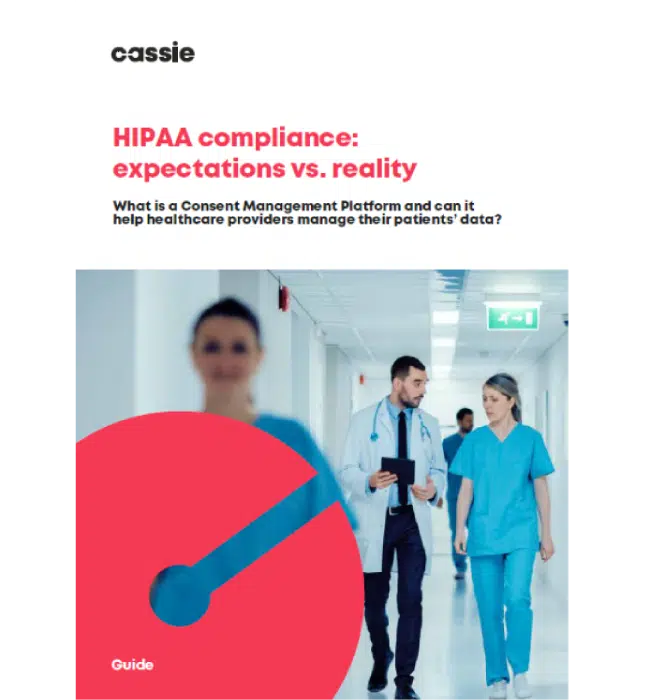Top 10 data privacy & consent factors for healthcare compliance
Posted: January 15, 2023
As technology advances, the importance of data privacy in healthcare cannot be overstated. Patients are rightfully concerned about the safety and security of their personal information, and they expect healthcare workers to take their privacy seriously.
To ensure patients have control over their personal data, healthcare providers must obtain consent before accessing private information. This crucial step empowers patients to decide who can see their information and to what extent.
However, obtaining consent is just one aspect of protecting patient data. Healthcare organizations must also take strong security measures to prevent unauthorized access, such as encryption, physical restrictions, and digital authentication methods.
We have created a list of the top 10 things healthcare providers should know to enhance their understanding of the significance of consent and data privacy in healthcare.
1. The importance of data privacy laws
The General Data Protection Regulation (GDPR) is a regulation in EU law on data protection and privacy for all individuals within the European Union. It was designed to harmonize data privacy laws across Europe, to protect and empower all EU citizens’ data privacy and to reshape how organizations across the region approach data privacy.
HIPAA (Health Insurance Portability and Accountability Act) is a US law that establishes standards for protecting certain health information. It requires organizations that handle this sensitive information to adhere to specific security requirements such as encrypting data at rest and in transit and having a secure system for authentication.
2. Patients have a right to control their own data
In the healthcare sector, patients have a right to consent to how their data is used, collected, stored and protected. This means that individuals must consent to the processing of their personal data before it can be shared or used for any purpose.
Data privacy is an important component of healthcare, ensuring that a patient’s sensitive information remains secure and private. Additionally, consent is a key factor in ensuring that data privacy is observed, as it allows individuals to decide how and when their information is used. This helps ensure that the data remains confidential while still providing medical professionals with the necessary resources to provide quality care.
Furthermore, consent also serves as an assurance of transparency; patients should be made aware of how their data is being used and stored and given the opportunity to consent or revoke consent for a particular purpose. By granting consent, individuals are granted control over their own data, which can help protect them from potential privacy violations.
3. Patients have the right to access their own data
Patients have the right to access, manage and consent to how their personal data is used. This includes the right to request a copy of their data, ask for changes to be made, request that data is deleted or even limit the way it is used. With technological advances, there are now many more ways organizations can collect, process and store data. Consent is increasingly important when protecting a patient’s data privacy.
Organizations must be transparent in how they use patient data and ensure patients give that consent before any information is shared. Patients should also be informed of their rights to access and manage the consent they provide. Organizations must also keep consent up to date and allow patients to change their consent preferences at any time.
4. The importance of informed consent
Informed consent is an essential part of patient care, as it ensures that patients understand the risks, benefits, and alternatives associated with their healthcare decisions. Informed consent allows patient autonomy by allowing them to make autonomous decisions about their health and well-being, while also protecting patient rights of autonomy and self-determination.
Patients must be given all the information they need to make an informed decision. This includes patient data such as their medical history, any treatments they’ve had in the past, and any risks associated with a particular treatment or procedure. By obtaining patient data through informed consent, healthcare practitioners are able to provide the most effective and safe care for their patients.
5. The need for secure storage and transmission of data
It is important to store and share patient data securely. This means consent must be given first before data can be used, and the data should not be shared with anyone who does not have consent.
Data privacy should also be respected so no one can access the patient’s data without permission. A data breach is when someone tries to get access to the information without consent, which is why it is important to store and share patient data securely.
Patients should be informed of their rights regarding consent and data privacy, as well as how to protect themselves from a data breach. Furthermore, healthcare providers should take steps to prevent data breaches by encrypting patient data, controlling access to systems, and training staff on best security practices. By taking these precautions, patients can trust that their information will remain private and secure.
6. Data breaches can result in serious consequences
The consequences of a data breach in healthcare can be devastating. Not only does it compromise patient privacy and confidentiality, but patient data is among some of the most valuable information on the dark web.
Data breaches can lead to identity theft, financial fraud and even physical harm if medical information containing sensitive patient details is stolen and used maliciously. Beyond these potential threats, healthcare organizations also face significant financial and reputational losses due to data breaches.
7. The role of technology in data privacy and security
In healthcare, technology plays an increasingly important role in data privacy and security. With the rise of electronic health records, digital imaging systems and patient portals, technological advancements have allowed for more efficient storage and transmission of medical information. However, this also creates a need for robust security measures to ensure that sensitive patient data remains secure.
One way to improve healthcare data security is through encryption. Encryption works by scrambling sensitive data so it can’t be read without the appropriate key. This makes it difficult for malicious actors to access protected information, even if they manage to breach a system’s defenses.
8. The need for ongoing training and education
It is of the utmost importance that healthcare providers and staff remain updated on data privacy and consent changes, as failure to do so could have serious consequences for patients.
Healthcare providers must ensure that their security policies and procedures are up to date and enforced, as well as train all staff on data privacy matters. Additionally, it is important for medical organizations to have an effective patient consent process that includes obtaining properly documented consent from patients on the use, sharing and storage of their personal data.
9. The interplay between privacy and wearable technologies
Innovations in wearable technologies have revolutionized the healthcare industry. Wearable devices like smartwatches, fitness trackers, and sleep monitors provide users with a convenient and accurate way to monitor their health.
Healthcare providers must ensure that data collected by wearable devices is used responsibly, and that it is only shared with the user’s explicit consent. To protect patient privacy, healthcare providers should develop policies to regulate how data is collected, stored, and shared.
10. The global nature of data privacy and security
With the increasing globalization of healthcare, it is essential to be aware of and adhere to data privacy regulations that are applicable across different countries. Many countries have enacted laws and regulations to protect the private information of their citizens, such as the General Data Protection Regulation (GDPR) in Europe and the Health Insurance Portability and Accountability Act (HIPAA) in the United States.
Failing to comply with these laws can result in hefty fines and penalties and even a criminal conviction. It is important to be aware of local data privacy regulations, as well as international treaties that may apply to healthcare organizations operating across multiple countries.
Furthermore, it is essential for organizations to have appropriate systems and processes in place to ensure that they are compliant with these laws and regulations. Healthcare organizations must also be aware of their obligations when transferring information outside of their country and take the necessary steps to protect patient data.
Want to learn more about the evolution of data privacy in healthcare?
Consent Management Platforms offer a viable solution for healthcare providers to comply with the stringent regulations laid out by HIPAA, ensuring the safe and confidential handling of all patient data.
- Achieve comprehensive compliance with HIPAA regulations
- Securely store patients’ personal data
- Create a detailed audit trail for all access permissions and modifications
- Offer a convenient method for securely tracking, managing, and sharing sensitive data
- Enhance the understanding of how patient data is utilized and ensure its appropriate use.
To discover how Cassie can assist healthcare providers in surpassing their compliance goals and achieving advanced levels of connected care, take a look at our healthcare sector case study.

HIPAA compliance: Expectations vs. Reality
Read our HIPAA compliance: Expectations vs. Reality guide to understand how a Consent Management Platform (CMP) can help healthcare providers achieve HIPAA compliance.
Read the full guide by following the below:

